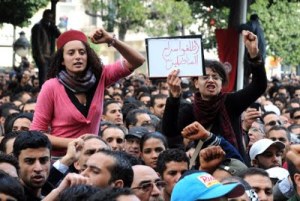In the 1950s, Tunisia undertook as first country in the Arab world steps to eliminate early marriage by setting a minimum age and was among the first Arab countries to assign women the right to vote. Since then, Tunisia has long had the most progressive and liberal stance towards women in the Arab region. In recent years successive steps have been taken to further improve women’s rights. Domestic violence has been criminalised, contraceptives have been made available, and regulated abortion has become legal. Recently, Tunisia ruled that parties are required to have equal numbers of men and women in electoral lists.
Image source: http://thepathans.blogspot.com/Since the 2000s, many other countries have followed Tunisia on some points. Egypt, Libya and Morocco have introduced reforms to give women greater rights to pass on citizenship to children. In Algeria, Iraq and Morocco, sexual harassment in the workplace is banned legally.There is justified hope that the Arab spring will further boost the emancipation process in the Arab world, as women’s participation in the Arab Spring has been significant. Many women have been participating in sit-ins and marches and have become politically engaged.
However, the expansion of women’s rights in Arab countries cannot be taken for granted, as gender norms are very rigid and change, if at all, very slowly. In some regions, one can even observe a rising conservatism going hand in hand with the Arab spring. Women have been criticized by some male protestors for their public involvement in the Arab Spring, as women being active in the public sphere are considered as acting against religious norms. Moreover, in times of high unemployment and uncertain economic conditions, some voices are advocating that women should be banned from the workplace as a way to solve male unemployment.
This call is done in disregard of the fact that the female share of the labour force is relatively small. On average, female employment rates account only for one third of male employment rates in the Arab region. Restrictions from working the same hours and from taking up the same jobs as men significantly limit women’s job opportunities and therewith their income and career perspectives. Moreover, due to a strong adherence to traditional gender roles, there is little concept of sharing household or childcare responsibilities among spouses, which urges many women to renounce their chances of a career.
However, in most Arab countries, women do not only face discrimination when it comes to labour market activities. One of the most discriminatory aspects for women concerns their physical integrity. In Libya, gender-based violence continues to escalate as a weapon of war. In Egypt, female genital mutilation is still widespread even though illegal since 2008.
Another problem concerns women’s personal law status, which governs things such as marriage, divorce and child custody. Sometimes, Muslim women are not allowed to marry a non-Muslim man, although a Muslim man can be married to a non-Muslim woman. It is also common that divorce proceedings initiated by women are cumbersome and difficult. Indeed, in most Arab countries there is progress concerning women’s legal situation. However, women often lack the economic resources to petition courts and cultural norms dissuade them from filing complaints in court. Hence, there is a strong need to ensure that laws, once created, are applied regardless of people’s sex, their geographical location or their socio-economic condition.
To further increase women’s participation in the economy, in the public sphere and in society, it is necessary that women continue to make their voices heard in the Arab world. Therefore, women need moral and financial support, provided not only by national governments but also by the international community. The progress of the feminist movement in the Arab world is actually highly dependent on a successful democratisation. To date, the overall representation of women in parliaments is still very low in the Arab region, ranging around 10% on average. However, in Tunisia, Egypt, Jordan and Morocco, considerable efforts have been made over the last 10 years to increase women’s share in parliaments. This raises hope that the emancipation progress, which has just been starting in many Arab countries, will step up over the next years.
By Angela Luci from Gender Debate
Sources: blog author’s own contribution, Gulfnews, Masterpeace, USIP


No comments:
Post a Comment